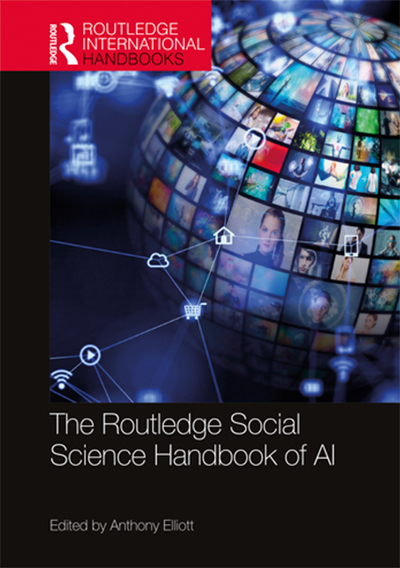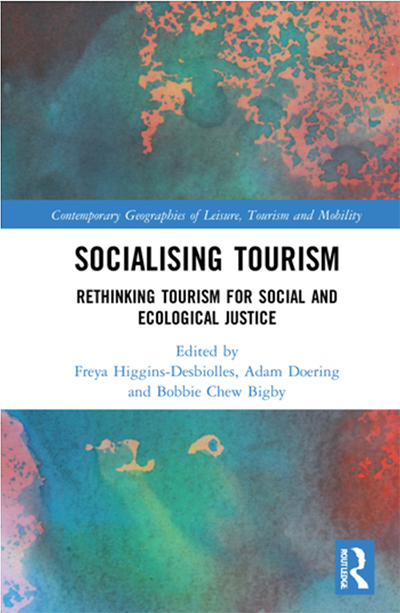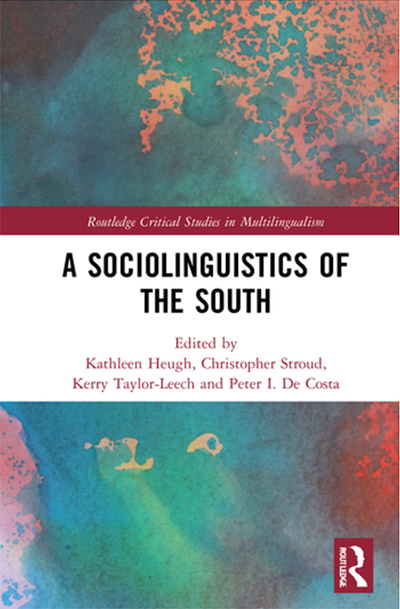The latest books from UniSA researchers
- The Routledge Social Science Handbook of AI
- Socialising Tourism: Rethinking Tourism for Social and Ecological Justice
- A Sociolinguistics of the South
The Routledge Social Science Handbook of AI

A landmark volume providing students and teachers with a comprehensive and accessible guide to the major topics and trends of research in the social sciences of artificial intelligence (AI), edited by UniSA Dean of External Engagement Professor Anthony Elliott, has been published.
The Routledge Social Science Handbook of AI also surveys how the digital revolution – from supercomputers and social media to advanced automation and robotics – is transforming society, culture, politics and economy.
The handbook provides representative coverage of the full range of social science engagements with the AI revolution, from employment and jobs to education and new digital skills to automated technologies of military warfare and the future of ethics. The reference work is introduced by Prof Elliott, who addresses the question of the relationship of social sciences to artificial intelligence, and who surveys various convergences and divergences between contemporary social theory and the digital revolution.
The handbook is exceptionally wide-ranging in span, covering topics all the way from AI technologies in everyday life to single-purpose robots throughout home and work life, and from the mainstreaming of human-machine interfaces to the latest advances in AI, such as the ability to mimic (and improve on) many aspects of human brain function.
A unique integration of social science on the one hand and new technologies of artificial intelligence on the other, the handbook offers readers new ways of understanding the rise of AI and its associated global transformations. Written in a clear and direct style, the handbook will appeal to a wide undergraduate audience.
The book is available from Routledge.
Socialising Tourism: Rethinking Tourism for Social and Ecological Justice

A new book about socialising tourism, co-edited by UniSA Adjunct Senior Lecturer Dr Freya Higgins-Desbiolles, has been published. Socialising Tourism: Rethinking Tourism for Social and Ecological Justice looks at socialising tourism as a broad conceptual focal point and guiding term for industry, activists and academics to rethink tourism for social and ecological justice.
Tourism was once touted as the world’s largest industry and also a tool for fostering peace and global understanding, and has certainly been a major force shaping the world. The recent COVID-19 crisis has led to calls to transform tourism and reset it along more ethical and sustainable lines. It was in this context that calls to "socialise tourism" emerged (Higgins-Desbiolles, 2020). This edited volume builds on this work.
Socialising Tourism means reorienting travel and tourism based on the rights, interests, and safeguarding of traditional ecological and cultural knowledges of local peoples, communities and living landscapes. This means making tourism work for the public good and taking seriously the idea of putting the social and ecological before profit and growth as the world re-emerges from the COVID-19 pandemic. This is an essential first step for tourism to be made accountable to the limits of the planet. Concepts discussed include Indigenous culture, toxic tourism, a "theory of care", dismantling whiteness, decolonial tourism and animal oppression, among others, all in the context of a post-COVID-19 world.
This will be essential reading for all upper-level students, academics and policymakers in the field of tourism.
The book is available from Routledge.
A Sociolinguistics of the South

A new book about multilingualisms in southern communities, co-edited by Associate Professor in Applied Linguistics Associate Professor Kathleen Heugh, has been published.
A Sociolinguistics of the South brings to life initiatives among scholars of the south and north to understand better the intelligences and pluralities of multilingualisms in southern communities and spaces of decoloniality.
Chapters follow a longue durée perspective of human co-existence with communal presents, pasts, and futures; attachments to place; and insights into how multilingualisms emerge, circulate, and alter over time. Each chapter, informed by the authors’ experiences living and working among southern communities, illustrates nuances in ideas of south and southern, tracing (dis-/inter-) connected discourses in vastly different geopolitical contexts. Authors reflect on the roots, routes and ecologies of linguistic and epistemic heterogeneity while remembering the sociolinguistic knowledge and practices of those who have gone before. The book re-examines the appropriacy of how theories, policies, and methodologies ‘for multilingual contexts’ are transported across different settings and underscores the ethics of research practice and reversal of centre and periphery perspectives through careful listening and conversation.
Highlighting the potential of a southern sociolinguistics to articulate a new humanity and more ethical world in registers of care, hope, and love, this volume contributes to new directions in critical and decolonial studies of multilingualism, and to reimagining sociolinguistics, cultural studies, and applied linguistics more broadly.
The book is available from Routledge.
Other Stories
- Accenture and UniSA join forces to develop the digital business skills of tomorrow
- New ‘Goldilocks calculator’ could be key to ensuring children’s health
- Pioneering tech enables monitoring of a baby’s vital signs without contact
- Three minute thesis winner to make ovarian cancer treatment more effective
- From the Vice Chancellor
- Achievements and Announcements
- Olympic medal hopes for sonography student prove ‘ultra sound’
- UniSA launches guide to foster respectful engagement with Aboriginal Peoples
- Video: Innocent or guilty? Virtual reality gives us the verdict
- Meet the UniSA student who’s risen to footballing fame with the Crows
- The latest books from UniSA researchers
- In Pictures: Purkarninthi in Residence art installation launch and 2021 Art on Campus Exhibition




